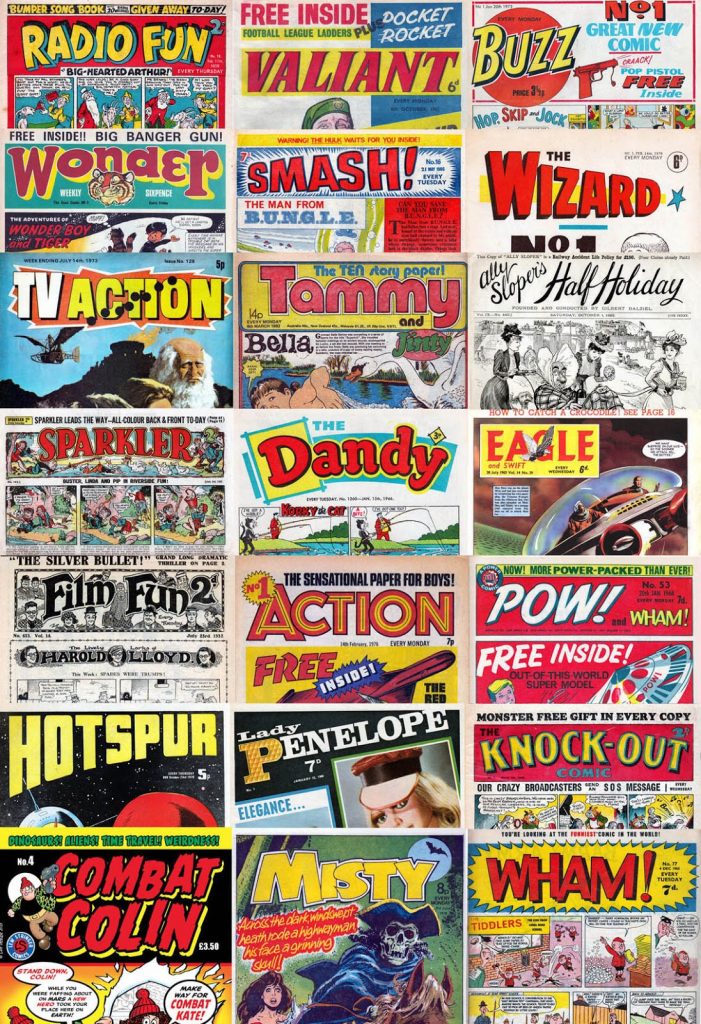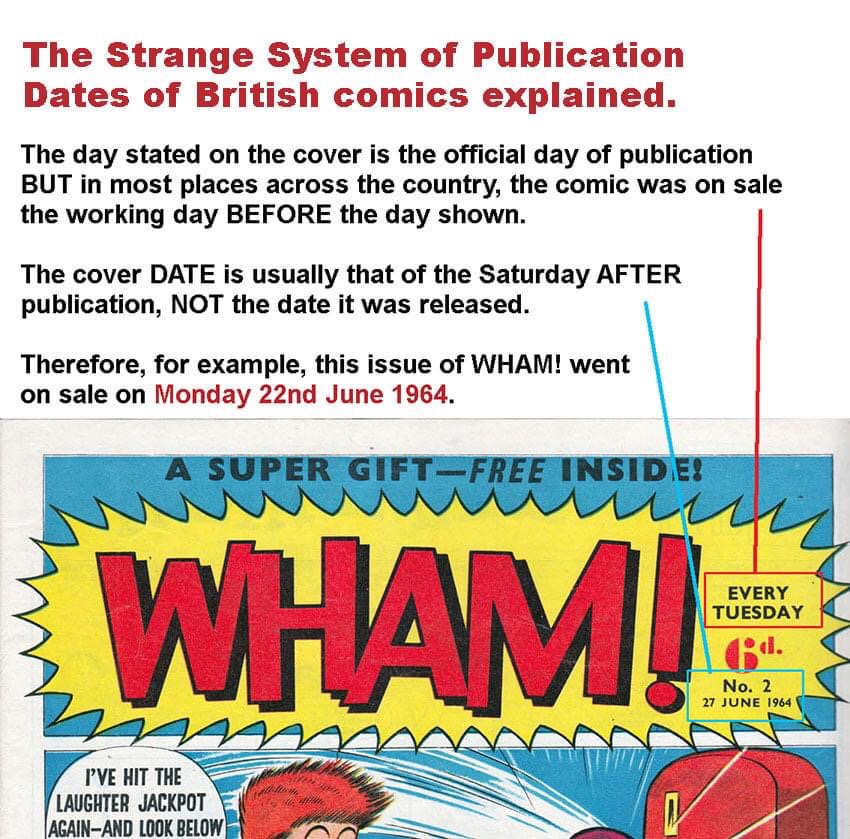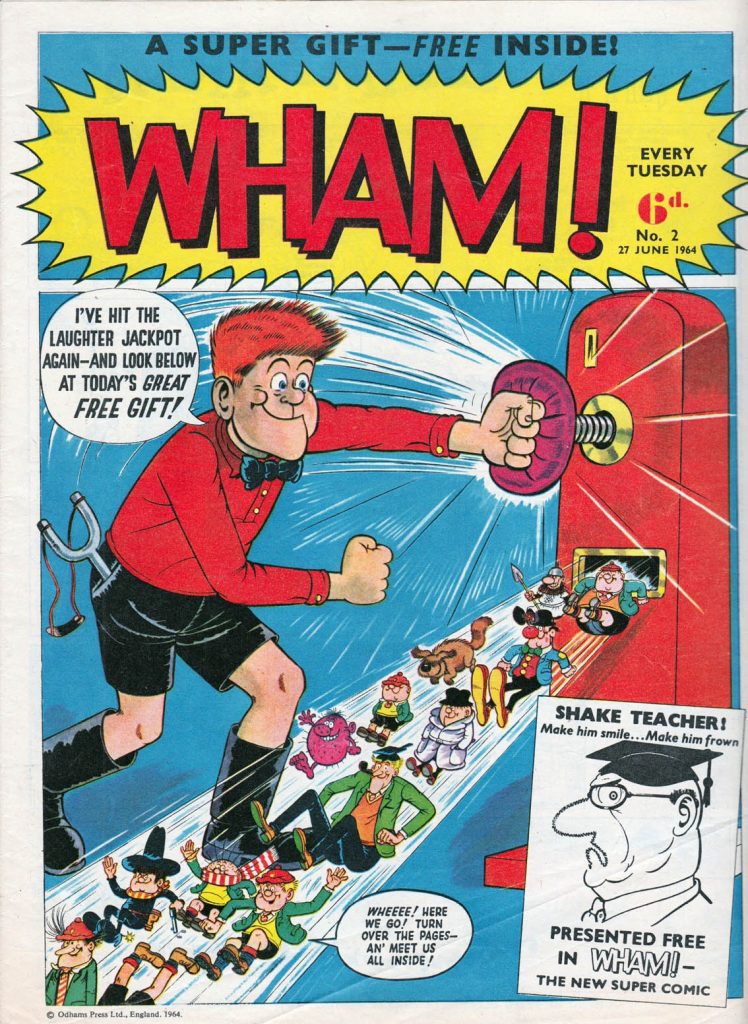
British comics publishers – and, indeed, any publisher – love a good anniversary. Who doesn’t want to celebrate milestone dates for a long-running title? It gives many readers a feel good buzz, you can hang a promotion around it. News sites can give your celebration an extra boost, with “On This Day” styled reports.
Sounds great, right?
Except, in many cases, unless it’s a milestone issue number that’s being marked, all those celebrations and anniversary posts are appearing a week later than they actually need to.

This is because, as a general rule of thumb, with the exception of, for example the modern 2000AD, the cover date of a classic British comic like Battle Picture Weekly, BEANO, or Whizzer and Chips was is actually some days later than when it on sale, not on!
Yes, that’s right, cover dates are, for some at least, a week later than the actual on sale date, because they were there to instruct newsagents just when to take a title off the rack and load up the new edition. It was a Keep It Simple Stupid means to assist busy staff in the days before the off sale checklists you might see a WHSmith employee working to today, alongside their latest planogram.
Confused? Don’t worry. So are a lot of people.
Thankfully, in part born from frustration as a comics archivist as well as comic creator who’s seen many a “fake” anniversary, Lew Stringer has created a handy graphic, that explains this head scratcher for many.

“I hope it helps!” he says. “I think the problems began with Denis Gifford‘s books, as he always stated the cover date as publication day, which was wrong, and has led to comics like 2000AD celebrating its birthday on the wrong day every year. (These days, 2000AD‘s cover date is its publication day, but that wasn’t the case originally).
We do, too… Yours to cut out (er, print out) and keep, readers!
However, a quick note of caution. Before anyone tries to apply a “rule of thumb” to this system, I should warn you that you shouldn’t regard all cover dates as “off sale dates”. While the cover date for titles published on a Saturday was, usually, a week later, for titles that came out mid week (like, for example, Battle, The Beano, Topper and TV Century 21), they would still be on sale until the Wednesday after the Saturday cover date.
“All comics carried the date of the following Saturday, whether they went off sale that day or not. Even now, today’s BEANO has Saturday’s date but it won’t be replaced on the shelves until next Wednesday.”
Oh, wait! You want the whole cover, drawn by Leo Baxendale, to savour too, right? Here it is, courtesy of Lew… find out more about the early issues of Wham! here
With thanks to Lew Stringer. This item has been updated for hopeful clarification since first posted!
Wham!, Whizzer and Chips copyright Rebellion Publishing Limited
The founder of downthetubes, which he established in 1998. John works as a comics and magazine editor, writer, and on promotional work for the Lakes International Comic Art Festival. He is currently editor of Star Trek Explorer, published by Titan – his third tour of duty on the title originally titled Star Trek Magazine.
Working in British comics publishing since the 1980s, his credits include editor of titles such as Doctor Who Magazine, Babylon 5 Magazine, and more. He also edited the comics anthology STRIP Magazine and edited several audio comics for ROK Comics. He has also edited several comic collections, including volumes of “Charley’s War” and “Dan Dare”.
He’s the writer of “Pilgrim: Secrets and Lies” for B7 Comics; “Crucible”, a creator-owned project with 2000AD artist Smuzz; and “Death Duty” and “Skow Dogs” with Dave Hailwood.
Categories: 2000AD, British Comics, Creating Comics, downthetubes Comics News, downthetubes News

 First British International Comic Rights Market – publishers and creator lineup revealed
First British International Comic Rights Market – publishers and creator lineup revealed  British creators Liam Sharp, Richard Starkings and Bryan Talbot, among 2024 Eisner Award nominees
British creators Liam Sharp, Richard Starkings and Bryan Talbot, among 2024 Eisner Award nominees  Mike Carroll and John Higgins dive deep into ‘Dredd’ prequel ‘Dreadnoughts’
Mike Carroll and John Higgins dive deep into ‘Dredd’ prequel ‘Dreadnoughts’  Remembering Jon Haward: A Tribute by Tim Perkins
Remembering Jon Haward: A Tribute by Tim Perkins
Knew this! (Feeling slightly smug…). Actually it did confuse me for years. I grew up in Northern Ireland and most of the comics I bought hit the shelves every Friday, a full eight days before the date on the cover. Can’t remember how I found out about how the date was the ‘return date’ but actually it makes a lot of sense for newsagents.